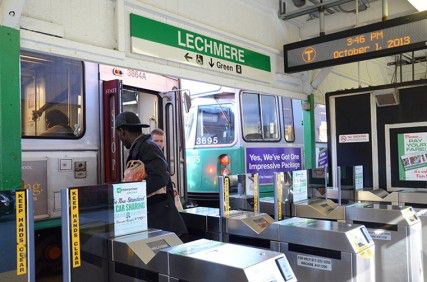
With the approval of its construction contract on Sept. 25, the Massachusetts Bay Transportation Authority can move forward with its Green Line Extension Project to build three more stations.
The $393 million contract signed by the Massachusetts Department of Transportation Board of Directors will fund phase two of the three-phase extension. The money will pay for the construction of a new Lechmere station and the addition of Union Square and Washington Street stops in Somerville.
“This will help us start to repaint the community,” said Somerville Mayor Joseph Curtatone. “Trains unlock so many opportunities. We’ll see more justice for our environment and our residents who have suffered for years. We’ll be able to connect people to academia, jobs and healthcare. We’ll be able to become more multi-modal. We’ll be able to become healthier. I think the opportunities are limitless.”
The project, while mandated to be finished in 2014, is expected to be completed in 2017, according to the GLX project.
MassDOT and MBTA spokeswoman Kelly Smith said GLX is mandated by law as a part of the Central Artery Project. The phase two contract was created with the oversight of the Conservation Law Foundation in an effort to make sure plans were environmentally safe.
Rafael Mares, CLF staff attorney, said whatever concerns they had for this phase were well addressed by MassDOT.
“It’s a great project and we want to get it done as quickly as possible,” he said. “It gets people off the road and it also makes it easier for those without a car,” he said. “Many people don’t have access to those institutions [through public transportation] that are actually relatively close, and now they’ll be able to.”
Smith said funds for the project will be split, with about half coming from state taxes and the other half from federal taxes. Some of the state tax revenue required has already been set aside for the project, and much of the federal money, while not yet available, will be accessible in the future.
Mary Ainsley, senior director of design and construction for the Green Line, said the project would go smoothly, and that funding for the project would not become an issue.
“We’ve been designing this project since 2011,” she said. “It’s happening now because plans have progressed and enough money has become available. I don’t foresee any problem.”
Some residents said adding more stops to the Green Line would help connect Boston to Somerville.
“We need more mass transit, and this is a step in the right direction,” said Jed Horwitt, 32, a resident of Brookline. “Our generation doesn’t want the headache of driving. We don’t have the love affair with cars the way the baby boomers did. Our generation is supposed to move past that, so yes, it’s a little expensive, but it’s extremely worth it.”
Kasey Cox, 26, a resident of Boston, said the project could help bring more wealth to Somerville.
“The parts that don’t have public transportation, here and across the country, they tend not to have as much money,” she said. “[In] places without it, the income seems to generally be lower, so anything we can do to fight that, I’m for it.”
Fred Mahoney, 69, a resident of Brighton, said he uses mass transit solely for transportation and the cost of the project was too high, but Boston and Somerville would still be better off with the additional stops.
“Everything the MBTA does is too expensive, and it would seem to me this project, like many of their others, could be done much cheaper,” he said. “But it’s very valuable to everybody involved … and if you ask me, it’s about time this happened.”
This is an account occasionally used by the Daily Free Press editors to post archived posts from previous iterations of the site or otherwise for special circumstance publications. See authorship info on the byline at the top of the page.




Why is the MBTA spending $396 million to extend the Green Line when they could put that money toward bringing the current subway system up to par? The Red Line and Orange Line need new subway cars – the “newest” ones are 20 years old, and the oldest are 40+ – would you drive a 40-year-old car to work in the morning?
It’s disgusting, and this project will certainly put the MBTA into even more debt.
The MBTA doesn’t have a choice on this project. The state was sued during the Big Dig project by environmental groups because of the future pollution that would be caused by the expanded highway. As part of the settlement, the state agreed to extend the Green Line. The MBTA is not electing to move forward with this project; they are legally obligated by the state to move forward with it.
Furthermore, the T doesn’t have one pot of money that all of their expenses come out of. In particular, there is a very clear distinction in the T’s budget between Operating and Maintenance and Capital Projects. Operating and Maintenance would cover the items you talked about while this project would be budgeted in the Capital Projects. This is actually a really great thing! Capital Projects such as this get large amounts of funding through Federal grants. In reality, the state Department of Transportation and the Federal government are paying for the extension and it is not taking from the MBTA’s budget for new cars.